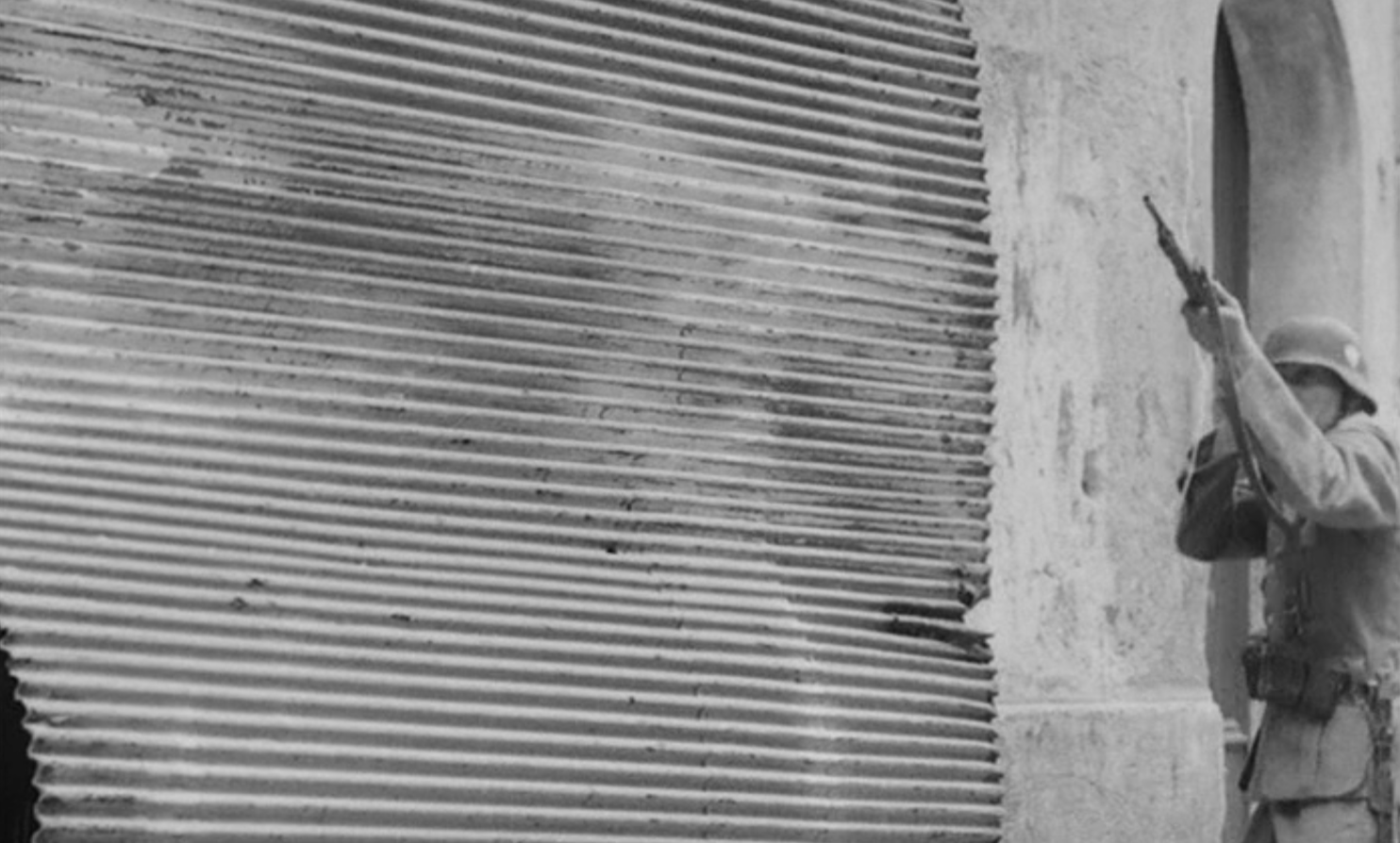Regia / Director: Nanni Loy, 1962
Un gruppo di italiani spinge un autobus malconcio. Due compagni aprono un pesante portone per farli passare.
"Dai! Dai!"
"Forza!"
A group of Italians is pushing a battered bus. Two comrades open the heavy portal to let them through.
“Come on!”
“Go!”
La macchina da presa fa una panoramica su uno stretto vicolo, che gli uomini bloccano con l'autobus.
The camera pans over to a narrow alleyway, which the men block with the bus.
Un abitante in pigiama si sporge dal suo balcone. "Proprio qua venite a sparare? Fate la guerra sotto casa vostra!" Gli uomini lo ignorano e si preparano all'attacco, salendo su una scala e sistemandosi sul tetto dell'autobus. "Voi non parlate?” – dice rivolto ai vicini. Poi si rivolge ai combattenti. “Sparate dove volete, ma non qui!"
A resident in pajamas leans over his balcony. “Right here you come to shoot? Make war at your own house!” The men ignore him and set themselves up for the attack, climbing a ladder, settling on the roof of the bus. “Don’t you say anything?” he says, turning to his neighbors. Then he turns to the combatants. “Shoot wherever you want – but not here!”
Una passante con in braccio un bambino è d'accordo: "Ve ne dovete andare. Vogliamo stare tranquilli".
"Andatevene prima che arrivino i tedeschi!" implora l'uomo in pigiama.
A passerby with a baby in her arms agrees: “You have to leave. We want to be at peace.”
“Leave before the Germans come!” the man in pajamas begs.
"Per questo siamo qua!"
"Ve ne dovete andare subito!"
Poi un avvertimento sussurrato: "I tedeschi!" Gli uomini tacciono e si accovacciano. C'è il rombo lontano di veicoli che si avvicinano.
Degli uomini con i fucili attendono sui tetti, i cui contorni angolari formano una composizione calma di forme geometriche astratte.
“That’s why we’re here!”
“You have to leave immediately!”
Then a whispered warning: “The Germans!” The men fall silent and crouch down. There is the distant roar of vehicles approaching.
Men with rifles wait on the rooftops, whose angular contours form a calm composition of abstract geometric shapes.
Due tedeschi arrivano in moto. In questo campo lungo, sono incorniciati da macerie e travi metalliche cadute. Sopra le loro teste, delle camicie appese ad asciugare su un filo aggiungono un tocco di normalità.
Two Germans arrive by motorcycle. In this long shot, they’re framed by rubble and fallen metal beams. Above their heads, shirts hanging on a line to dry add a touch of normalcy.
Segue un convoglio di jeep e motociclette, ma la strada è bloccata.
A convoy of jeeps and motorcycles follows, but their way is blocked.
Quando gli italiani iniziano a sparare, i soldati cadono morti.
When the Italians begin firing, soldiers fall dead.
Gli italiani nell'autobus rompono i finestrini e aprono il fuoco. I tedeschi, riparandosi, rispondono.
The Italians in the bus break out the windows and open fire. The Germans, taking cover, shoot back.
Vediamo gli italiani sparare dai tetti, dai balconi e da sotto i veicoli, mentre i tedeschi rispondono al fuoco.
We see Italians shooting from rooftops, from balconies and from under vehicles, as the Germans return fire.
Due italiani portano via un compagno ferito. Una donna corre verso un uomo occhialuto che sta sparando da dietro un veicolo. "Totò!" – dice – "Ma come? Tu eri uscito per cercare il pane!"
Mentre i due litigano, lui continua a sparare.
Two Italians carry away a wounded comrade. A woman runs up to a man wearing glasses, who is firing from behind a vehicle. “Toto!” she says. “How is it possible? You went out to look for bread!”
As they argue, he keeps firing.
Altri tedeschi arrivano a piedi e svoltano in un vicolo.
More Germans arrive on foot and turn into an alleyway.
Dall'alto, gli italiani si sporgono dai loro balconi e buttano giù sui tedeschi il contenuto dei loro appartamenti: librerie, comò, sedie, un lavandino.
I soldati sparano verso l’alto contro di loro.
From above, Italians lean over their balconies and throw the contents of their apartments down on the Germans: bookcases, dressers, chairs, a sink.
The soldiers shoot up at them.
Nonostante la pioggia di proiettili, i napoletani lanciano contro gli invasori tutto ciò che hanno.
In spite of the hail of bullets, the people of Naples throw whatever they have at the invaders.
Un uomo dice a un altro: "Cretino, ma che fai?! Il mio letto no! Prendi qualcos'altro!" Poi butta giù il tavolo della sala da pranzo.
A man says to another, “What are you doing, moron?! Not my bed! Take something else!” Then he throws his dining room table down.
Alla fine i soldati tedeschi ricevono l'ordine di ritirarsi e i residenti gioiscono.
"Li abbiamo fermati!"
"Ce l'abbiamo fatta!"
In ogni vicolo, su ogni balcone, Napoli è ribelle.
Finally, the German soldiers are ordered to retreat, and the residents rejoice.
“We’ve stopped them!”
“We’ve made it!”
In every alley, on every balcony, Naples is defiant.
FINE PARTE 13
Here’s Parte 14 of this cineracconto. Subscribe to receive a weekly email newsletter with links to all our new posts.













































